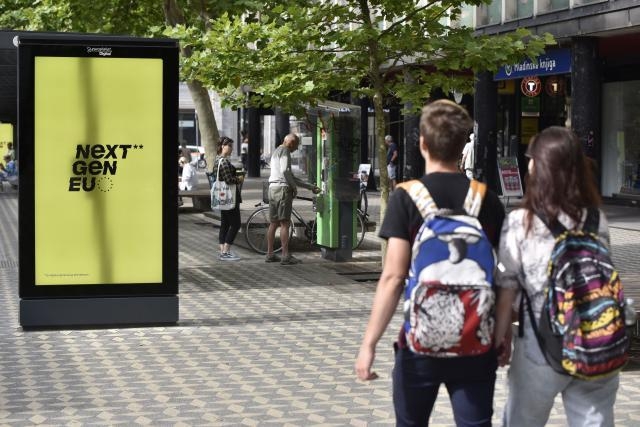The European Commission adopted on Tuesday a Communication marking the two-year anniversary of the creation of the Recovery and Resilience Facility (RRF), the key instrument at the heart of the almost € 800 billion NextGenerationEU recovery plan for Europe.
The aim of the RRF is to mitigate the economic and social impact of the coronavirus pandemic and make European economies and societies more sustainable, resilient and better prepared for the challenges and opportunities of the green and digital transitions. It makes available €723.8 billion in loans (€385.8 billion) and grants (€338 billion) for that purpose.
The Communication takes stock of the concrete results achieved so far through the RRF's double-push for green and digital reforms and investments in Member States. It also outlines further steps for supporting the continued successful implementation of national recovery and resilience plans.
The annexes to the Communication clarify certain technical aspects of the way in which the Commission assesses Member States' progress. To qualify for payment under RRF, Member States must satisfy a number of milestones and targets. A senior Commission official explained at a technical briefing on Tuesday that they are not equally important and have been given relative weights.
The weighting does not apply to the audit and control milestones and they must be fully met. The achievement of these milestones are assessed by the Commission when the payment requests are processed. According to the official, a majority of Member States have submitted their first payment requests and have had their audit and control systems approved.
To date, the Commission has disbursed over €144 billion under the RRF, including both grants (€96 billion) and loans (EUR €billion). Many more disbursements are expected as the implementation of the RRF is moving towards the second half of its lifetime. The Commission estimates that the investments funded by NextGenerationEU could boost the EU's GDP by around 1.5% in 2024.
Examples of reforms funded until now by the RRF are reforms of the civil and criminal justice systems in Italy, labour market reforms in Spain, improving affordable housing in Latvia, promoting investments in offshore renewables in Greece and enabling the digitalisation of schools and businesses in Portugal.
Around €203 billion of the total allocation contribute to measures aimed at reducing greenhouse gas emissions by at least 55% by 2030. Around €131 billion contribute to measures to digitally transform Europe's economies and societies. Around €138 billion has been dedicated to social spending and policies for the next generation.
The RRF regulation requires the Member States to target the climate objective and the digital objective by 37 % respectively 20 % of the total funding in their national plans. On EU level the average percentages are 40 % respectively 26 % but the figures vary widely by country.
The accelerated implementation of the RRF and the delivery on its objectives go hand in hand with a higher level of transparency on the functioning of the Facility, the Commission underlines. To enhance transparency, the Commission has set up a Recovery and Resilience Scoreboard, providing real-time information on the disbursements and progress made by Member States.
Among others, Member States are required to publish information on the 100 largest final recipients for each national plan. The senior Commission official told The Brussels Times that there is no limit on the size of the recipients and it reflects the size of the national economies.
“Our recovery plan NextGenerationEU has become even more than a vital response to the COVID-19 pandemic,” commented European Commission President Ursula von der Leyen. “Two years after the creation of the fund, we have already disbursed more than EUR 140 billion and we overachieved our initial investment targets for the green and digital transitions.”
“Now, with Russia's brutal invasion of Ukraine and a global energy crisis, the fund has become a key element of our Green Deal Industrial Plan. It will support our Member States on the road to net-zero, with the additional financial boost of REPowerEU.”
The REPowerEU Plan is the Commission’s response to the socio-economic hardships and global energy market disruption caused by Russia's invasion of Ukraine. In May 2022, the Commission proposed to make targeted targeted amendments to the RRF regulation to integrate dedicated REPowerEU chapters in Member States' existing Recovery and Resilience Plans.
In the Spring of 2023, Member States are expected to complement their recovery and resilience plans with REPowerEU chapters, to provide a joint response to the global energy crisis.
M. Apelblat
The Brussels Times

